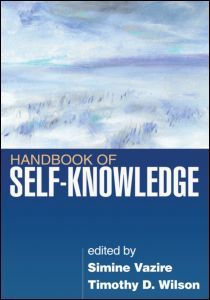Handbook of Self-Knowledge
Coordonnateurs : Vazire Simine, Wilson Timothy D.

This authoritative handbook reviews the state of the science of self-knowledge, a key emerging area in psychology. Leading investigators describe innovative theory and research that is shedding new light on how?and how accurately?people perceive their own traits, thoughts, feelings, behavior, and relationships. Coverage encompasses the behavioral, mental, biological, and social structures that underlie self-knowledge; approaches to studying self-beliefs in specific domains; and the motives and biases that influence accuracy. The volume explores the personal and societal benefits of self-knowledge and also considers possible ways to enhance it.
1. Introduction, Simine Vazire and Timothy D. WilsonI. The Origins and Nature of Self-Knowledge 2. The Development of Self-Knowledge, Daniel Hart and M. Kyle Matsuba 3. Self-Insight from a Dual-Process Perspective, Bertram Gawronski and Galen V. Bodenhausen 4. Referential Processing and Competence as Determinants of Congruence between Implicit and Explicit Motives, Oliver C. Schultheiss and Alexandra Strasser 5. Self-Knowledge: From Philosophy to Neuroscience to Psychology, Matthew D. Lieberman 6. Blind Spots to the Self: Limits in Knowledge of Mental Contents and Personal Predispositions, Jason Chin, Michael Mrazek and Jonathan Schooler 7. Other People as a Source of Self-Knowledge, Sanjay Srivastava 8. Self-Knowledge: An Individual-Differences Perspective, Roberta A. Schriber and Richard W. RobinsII. Domains of Self-Knowledge 9. Knowing Our Personality, Mitja D. Back and Simine Vazire 10. Knowing Our Attitudes and How to Change Them, Pablo Briñol and Richard E. Petty 11. Self-Knowledge, Unconscious Thought, and Decision Making, Maarten W. Bos and Ap Dijksterhuis 12. Knowing Our Emotions: How Do We Know What We Feel?, Gerald L. Clore and Michael D. Robinson 13. On (Not) Knowing and Feeling What We Want and Like, Galit Hofree and Piotr Winkielman 14. Partner Knowledge and Relationship Outcomes, Jeffry A. Simpson, Jennifer Fillo, and John Myers 15. Meta-Accuracy: Do We Know How Others See Us?, Erika N. Carlson and David A. Kenny 16. Knowing Our Pathology, Thomas F. Oltmanns and Abigail D. PowersIII. Knowing Our Past and Future Selves 17. Affective Forecasting: Knowing How We Will Feel in the Future, Kostadin Kushlev and Elizabeth W. Dunn 18. Past Selves and Autobiographical Memory, Colleen M. Kelley and Larry L. Jacoby 19. Self-Conceptualization, Self-Knowledge, and Regulatory Scope: A Construal-Level View, Cheryl J. Wakslak, Yaacov Trope, and Nira Liberman 20. Sitting at the Nexus of Epistemological Traditions: Narrative Psychological Perspectives on Self-Knowledge, Jonathan M. AdlerIV. Motives and Biases in Self-Knowledge 21. Illusions of Self-Knowledge, Katherine E. Hansen and Emily Pronin 22. Classic Self-Deception Revisited, Delroy L. Paulhus and Erin Buckels 23. On Motivated Reasoning and Self-Belief, Erik G. Helzer and David Dunning 24. From “Out There” to “In Here”: Implications of Self-Evaluation Motives for Self-Knowledge, Michael J. Strube 25. Reducing Egoistic Biases in Self-Beliefs, Mark R. Leary and Kaitlin Toner
Simine Vazire, PhD, is Assistant Professor of Psychology at Washington University in St. Louis. Her research examines how well people know their own personalities and behavior, and how well people know the impressions they make on others. Dr. Vazire has received the SAGE Young Scholar Award from the Foundation for Personality and Social Psychology, the Early Career Award from the International Society for Self and Identity, and the Outstanding Faculty Mentor Award from Washington University in St. Louis.
Timothy D. Wilson, PhD, is Sherrell J. Aston Professor of Psychology at the University of Virginia. He has conducted research in the areas of self-knowledge, happiness, social cognition, and using social psychological principles to solve personal and social problems. Dr. Wilson is a recipient of the All-University Outstanding Teacher Award and the Distinguished Scientist Award from the University of Virginia and is an elected member of the American Academy of Arts and Sciences.
Date de parution : 08-2012
Ouvrage de 464 p.
17.8x25.4 cm



